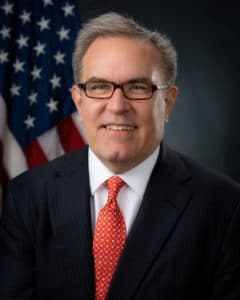Wheeler Responds to Written Questions from Senate Committee
 As part of the official record for his confirmation process to be permanent EPA Administrator, Mr. Andrew Wheeler answered a number of written questions from the Senators on the Environment and Public Works Committee that is considering his confirmation. Like the confirmation hearing on January 16, most of the questions related to issues other than drinking water. However, buried in the 150 pages of the written responses were some tidbits of interest to drinking water programs. Not surprisingly, some questions related to the government shutdown. Mr. Wheeler confirmed that EPA did not make its December 31 update of SDWIS data but that it would be updated now that full government operation has returned (page 52). Many questions related to PFAS actions taken or planned by EPA. The answers attempted to clarify that the timing of the release of ATSDR’s PFAS Toxicological Profile was not a “delay” but allowed for interagency coordination (page 119), specify the limited national occurrence of PFAS (page 34), describe the criteria EPA must use to determine if an MCL is needed (page 86) and clarify how ATSDR’s Minimum Risk Levels and EPA’s Health Advisories differ in purpose (page 120). In the responses, we gain some insight into the impact of the shutdown on pending regulations. EPA is maintaining existing schedules according to Wheeler. Specifically, his answer indicates that the proposed Lead and Copper Rule (LCR) revisions will go to the Office of Management and Budget (last hoop before publication) in the “spring” and that the rule on reduced lead content will also be finished in “2019” (page 38). Perchlorate is another pending rule with a recently extended court deadline of April 30, 2019. Although no alternative date was given, the answer pointed out that the deadline can be automatically extended due to circumstances like a lapse in government funding. Finally, in the answer to a question about compliance with the Lead and Copper Rule, Mr. Wheeler pointed out that due to focused action by states and EPA, 97% of LCR treatment technique violations have returned to compliance since 2016 (page 71).
As part of the official record for his confirmation process to be permanent EPA Administrator, Mr. Andrew Wheeler answered a number of written questions from the Senators on the Environment and Public Works Committee that is considering his confirmation. Like the confirmation hearing on January 16, most of the questions related to issues other than drinking water. However, buried in the 150 pages of the written responses were some tidbits of interest to drinking water programs. Not surprisingly, some questions related to the government shutdown. Mr. Wheeler confirmed that EPA did not make its December 31 update of SDWIS data but that it would be updated now that full government operation has returned (page 52). Many questions related to PFAS actions taken or planned by EPA. The answers attempted to clarify that the timing of the release of ATSDR’s PFAS Toxicological Profile was not a “delay” but allowed for interagency coordination (page 119), specify the limited national occurrence of PFAS (page 34), describe the criteria EPA must use to determine if an MCL is needed (page 86) and clarify how ATSDR’s Minimum Risk Levels and EPA’s Health Advisories differ in purpose (page 120). In the responses, we gain some insight into the impact of the shutdown on pending regulations. EPA is maintaining existing schedules according to Wheeler. Specifically, his answer indicates that the proposed Lead and Copper Rule (LCR) revisions will go to the Office of Management and Budget (last hoop before publication) in the “spring” and that the rule on reduced lead content will also be finished in “2019” (page 38). Perchlorate is another pending rule with a recently extended court deadline of April 30, 2019. Although no alternative date was given, the answer pointed out that the deadline can be automatically extended due to circumstances like a lapse in government funding. Finally, in the answer to a question about compliance with the Lead and Copper Rule, Mr. Wheeler pointed out that due to focused action by states and EPA, 97% of LCR treatment technique violations have returned to compliance since 2016 (page 71).
The next action on Mr. Wheeler’s nomination is a planned vote on his confirmation by the Committee on February 5. Although Democratic opposition may not have weakened since the hearing, unless Republican support waivers, a party-line vote should move the nomination to the Senate floor.

